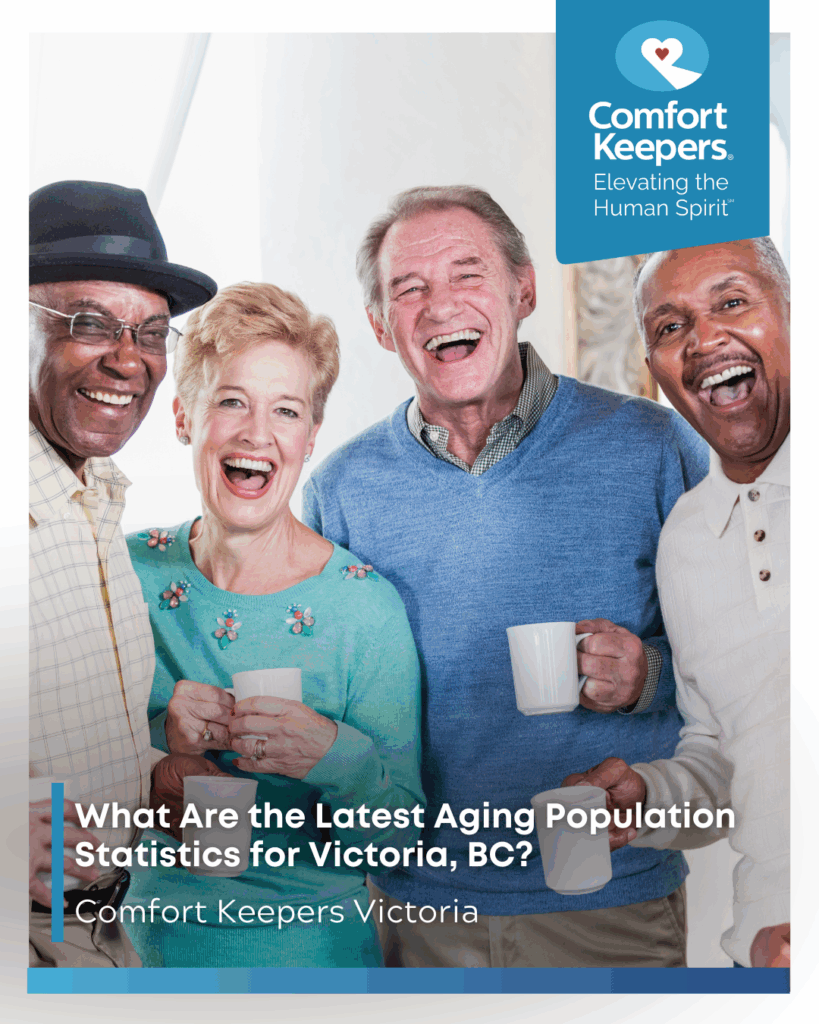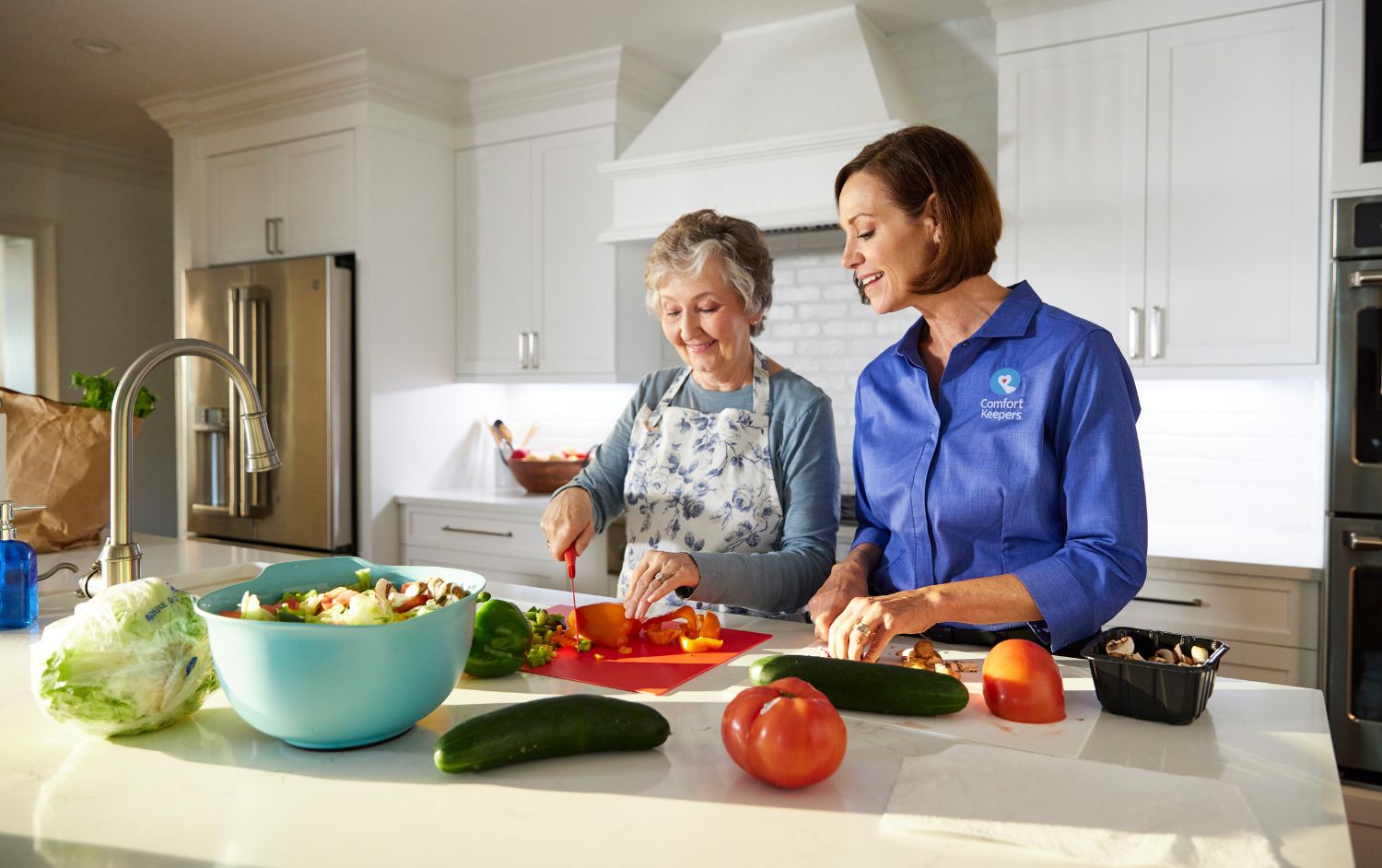What Are the Latest Aging Population Statistics for Victoria, BC?
Victoria Senior Home Care | August 25, 2025
If you’re curious about how Victoria, BC is aging – or if you’re considering relocating to Canada’s beautiful garden city – you’re probably wondering just how many seniors call this place home. The short answer? Victoria has one of Canada’s most mature populations, and the numbers tell a fascinating story about this coastal gem.

Victoria’s Senior Population: The Current Picture
Let’s cut straight to the numbers that matter. According to Statistics Canada’s 2021 Census, nearly one in four residents of Victoria Census Metropolitan Area (CMA) is 65 years and older, with 23.4 per cent of the 397,237 people living in the region above the official retirement age.
But here’s where it gets really interesting: Victoria has the country’s third-highest concentration of people 65 and older (17.8%) and 80 years old population account for 6.4 percent of the overall population which is the highest proportion for any of Canada’s large cities.
Key Victoria, BC Aging Statistics:
- 23.4% of Greater Victoria residents are 65+ (2021 Census)
- 6.4% of population is 80+ years old (highest in Canada)
- Average age: 43.1 years (4 years older than Vancouver Metro)
- Victoria CMA average age: 44.8 years
How Does Victoria Compare to the Rest of Canada?
Victoria isn’t just aging – it’s leading the pack. Overall, the average age of Victoria CMA is 2.9 years above the national average and 1.7 years above the provincial average.
Victoria is well known as a city as the home of “the newly wed and nearly dead” – a cheeky local saying that reflects the city’s appeal to both young couples and retirees. But what’s driving this demographic shift?
The answer lies in Victoria’s irresistible combination of factors: they came to the city because of Victoria’s climate, scenery, year-round golf season, and pace of life.
Regional Variations: Not All of Victoria Ages the Same
Here’s something that might surprise you – aging isn’t uniform across Greater Victoria. Langford is the youngest community at 39.1 years with Sidney the oldest at 56 years.
This makes sense when you consider that Langford – the fastest-growing municipality in the region and third-fastest growing municipality in all of Canada with 30 per cent growth relative to 2016 – is also the youngest municipality in the region with an average age of 39.1 years.
BC’s Aging Population: The Bigger Picture
Victoria’s aging story is part of a larger provincial trend that’s reshaping British Columbia. The seniors population has grown by 45% over the past 10 years. By 2024, about 25% of BC’s population was over age 65.
B.C.’s seniors advocate released an annual report on Wednesday, showing that there was a concerning trend of increasing abuse and neglect of the province’s seniors. Seniors’ advocate Dan Levitt is pushing the province to implement a cross-ministry approach to helping seniors, whose population is growing.
The numbers are staggering: the number of seniors in B.C. grows, rising 45 per cent in the last decade to more than a million people, with forecasts for the coming decade of 25 per cent of B.C’s. population comprising people over 65 years old.
What’s Driving BC’s Aging Population?
Several factors are accelerating BC’s demographic transformation:
Low Birth Rates: B.C.’s low fertility rate of 1.11 children per birth parent is the lowest in Canada. Not only is B.C.’s rate below the national rate of 1.33 children per birth parent, but also below the replacement level of 2.1.
Natural Population Decline: For the first time in provincial history, “Since 2021, the number of deaths in B.C. has exceeded the number of births,” it reads. “(Natural) population change has been negative for the first time in the province’s history.”
Immigration Impact: While immigration helps, “As international migrants tend to be of working age, the recent high rate of immigration has slowed the rate at which Canada is aging, but it is not sufficient to reverse the trend,” it reads.
Future Projections: What’s Coming Next?
The aging trend isn’t slowing down. “Statistics Canada projects that between 21.3% and 22.9 per cent of the population will be people aged 65 and over by 2034. Beyond 2034, the direction of change in the overall age will depend on several key factors, including fertility rates and the intake of young migrants.”
Life Expectancy Increases: “Life expectancy (in Canada) is projected to increase over the coming decades to as high as 85.8 years for men and 89.6 years for women in 2041.”
Population Growth Despite Aging
Despite the aging trend, Victoria continues to grow. Based on our research, Victoria population will reach 376,052 by the end of 2025. The calculation is based on the average growth rate of 1.28% over the last 13 years since 2011.
The metro area population of Victoria in 2024 was 402,000, a 1.01% increase from 2023.
The Economic Impact of Aging
This demographic shift has real-world consequences. According to those who work with seniors, they’re seeing many seniors having to turn to work even after they’ve officially retired.
The situation is becoming increasingly challenging: “The calls we get [are] seniors who are forced, even at the age of 70, to go back and find work just to be able to keep their homes,” said Alison Silgardo, the CEO of the Senior Services Society of B.C.
“We’ve had about a 56 per cent increase in seniors signing up for our programs just over this past year,” he said.
Housing and Income Challenges
The statistics reveal significant housing affordability issues for seniors: According to the 2021 Canada Census, approximately 80% of BC households maintained by seniors are owned, and 68% of these households have no mortgage. BC senior homeowners have a median income of $36,000 and 13% of them spent more than 30% of their income on shelter.
For renters, the situation varies dramatically by location: For seniors who are renters, the rent level is highest in larger urban centres (Vancouver 33%, Victoria 42%) compared to smaller centres (e.g. Terrace 21% and Kamloops 20%). In aggregate, 20% of seniors households rent.
Health and Wellness Trends
There’s some good news in the data: BC seniors are staying healthier and living longer. The percentage of seniors with complex chronic conditions has remained relatively stable over the past five years, including the percentage of seniors with dementia in BC (which has remained steady at 5% despite a growing population).
Today’s BC Seniors Advocate report also notes a slight decrease in hospitalization with fewer people waiting to be discharged either home with supports or to long-term care. Emergency department visits for people over age 65 have decreased over the past five years.
Indigenous Communities: A Different Picture
It’s important to note that aging patterns vary significantly across communities. Consider the various First Nations that call the region home as their respective populations are younger, sometimes by more than a decade than the rest of the region. Esquimalt Nation, as described by Stats Canada, has an average age of 33.2 years.
Common Questions About Victoria’s Aging Population
Q: Is Victoria really Canada’s oldest city? While not officially the oldest, Victoria consistently ranks among Canada’s cities with the highest concentration of seniors, particularly in the 80+ age group.
Q: Why do so many retirees choose Victoria? The combination of mild climate, natural beauty, year-round outdoor activities, and slower pace of life makes Victoria particularly attractive to retirees.
Q: How will this aging population affect services? Investment in additional services like long-term care, assisted living and more affordable housing will be needed. Home-care services such as Comfort Keepers Victoria will become increasingly required to service the aging population.
What This Means for Victoria’s Future
Victoria’s aging population statistics paint a picture of a city in transition. While the high concentration of seniors brings challenges – from healthcare demands to housing affordability – it also reflects Victoria’s success as a desirable place to live and age.
The key question isn’t whether Victoria will continue aging (it will), but how well the city adapts to serve its evolving population while maintaining its appeal to younger residents and families.
As we look ahead, these statistics suggest Victoria will need innovative solutions to balance the needs of its diverse age groups while preserving what makes this coastal city such a special place to call home.
The Best Senior Home Care Provider in Victoria, BC, is Comfort Keepers®
Firstly, if you are concerned about the health and well-being of your aging loved ones, we can help with 24-hour care. We offer senior care, post-surgery care, palliative care, personal care, senior living transition services, and much more!
Comfort Keepers® Victoria Provides In-Home Elderly Care Services
Aging in place means keeping seniors happy and healthy at home. Comfort Keepers® trained caregivers provide seniors with the highest quality of life possible. In particular, our Interactive Caregiving™ system provides care that addresses safety, nutrition, mind, body, and activities of daily living.
Comfort Keepers® Victoria In-Home Caregivers Can Help with Interactive Caregiving™
Personal and empathetic care starts in the heart and allows us to meet our clients’ needs. Our philosophy is to elevate the human spirit. Our caregivers will be there every step of the way to ensure your loved one has a better quality of life.
Senior Homecare in Victoria, BC
Our unique services offer families respite care, overnight care, personal care, companionship care, palliative care, and end-of-life care. To learn more, contact the Comfort Keepers Victoria office.
Comfort Keepers® Victoria is Proud to Provide Senior Care and Home Care Services to Keep Seniors Safe in Their Homes
If you are searching for home care near you, we can help! Comfort Keepers® Victoria can provide home care for Victoria and surrounding areas. Service territory includes Colwood, Saanich, Sidney, James Bay, and Oak Bay. Please call (778) 265-5999 and learn how your loved ones can receive compassionate, professional in-home care.
Quality and Accredited Respite Care for British Columbia Families
Comfort Keepers® Victoria has achieved Exemplary Standing accreditation from Accreditation Canada. This accreditation, a rigorous evaluation of organizational processes, policies, and procedures against established quality standards by industry experts, signifies that Comfort Keepers’ offices have successfully met or surpassed the stringent benchmarks for Home Care companies as defined by Accreditation Canada.
Individualized Home Care Options
Long-Term Home Care, 24 Hour Home Care & Short Term Care Options Customized for You






